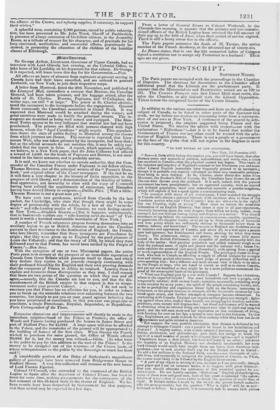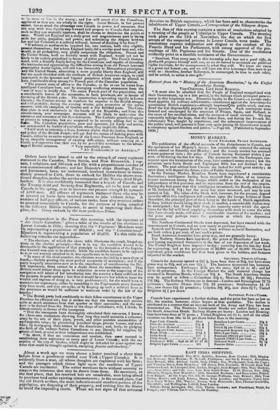In addition to the various speculations and facts on the
all-absorbing subject of Canada, to be found in other parts of the Spectator this week, we lay before our readers an interesting letter from a correspon- dent of our own at New York. A settlement of the quarrel by arbi- tration is proposed ; tbe umpires suggested being France and the United States. We receive the advice with respect—not with the exclamation " Ridiculous !"—but it is to be feared that neither the Government of France nor any other could be trusted with the arbi- tration of English interests. There is not a people or a government on the face of the globe that will not rejoice in the disgrace in store for this country.
" TO THE EDITOR OF THE SPECTATOR.
" New York, December 1.337.
" SIR—A little while before this reaches you, you will bare learnt, that after thirteen years and upwards of petition, remonstrance, and wordy war, a crisis has occurred in Canada—that the physical contest has begun. This result of the injustice and irnpolicy of England's conduct to her Provinces, you and some other Liberal English journalists have frequently pointed to as inevitable; though it is probable you scarcely calculated on these very reasonable anticipa- tions being so soon realized. At St. Charles, about thirty-five miles front Montreal, the Bunker's Hill of Canada, the Canadians have drawn the swordl like one who throws away the scabbard. It is said, indeed, that the present movement has been precipitated; but an oppressed country, with an injured and irritated population, must ever somewhat resemble a powder-magazine, which will explode if but a spark ignite a communicating train. " In common with many of may countrymen, I have watched the struggle in Canada with almost a personal interest, with emotions akin to those of the American patriot who said Our Country! may she alwas be in the right! but our Country, right or wrong !' How must we lament the miserable infatuation of an English Ministry, that doses it eyes to all past experience, wantonly incurring again the very dangers from which we have, indeed, on emerged, but not without lasting injury and disgrace as a nation ! Why should statesmen so lag behind the community in cownion sense—unable, apparently, to appreciate the simplest truths, or to act up to those principles of rectitude and true policy which are sufficiently obvious to thousands below them in station, talents, and knowledge ! The masses in England are doubtless averse to injustice and oppression in Canada, and above all, to a war upon a people poor and ignorant, but kind-hearted and brave, striving for what they deem liberty. The aristocracy, clergy, and gentry, the only classes fully rem- seated in the British Parliament, are incapable of perfect sympathy with the body of the nation: their peculiar prejudices and selfish interests weigh more than the national sense of right and justice and the national will ; hence Ca- nada exhibits the practical (not merely theoretical) evils arising from a partial or mock representation of the English People. The privileged classes in Eng- land, who look to Canada as affording a supply of official stations for younger sons and similar genteel adventurers, must judge of present difficulties with a corresponding bias: but a different and more correct view is likely to be taken by the People at large, who are taxed to enrich as well as to coerce Canada, and yet are not benefited as they might be by a more judicious economical di,. posal of the unoccupied lands of the provinces. " What can England gain by a war with Canada? Suppose her victorious, where is the expected benefit? She must henceforth rule over a people, only temporarily subdued; with an iron hand ; maintain, necessarily, a standing army in the country for many years ; the spirit of the people continuing hostile, and, so far as probability and experience throw light on the future, increasing in bitterness, as the people increase in strength, till the favourable OCCailOO for out. break again arises, and further attempts at conquest become chimerical. In contending with Canada, England can acquire neither glory nor strength : ght. hug against those who, weaker than herself, are struggling for freedom mad Irides. pendence, even victory will disgrace her ; her blood and treasure will be wasted in obtaining what no rational being can expect ever after to yield any tangible good; and she will once more seal her reputation on this coutinent, of being, with freedom for ever on her lips, a tyrant in very deed to her Colonies. Te this day, Englishmen are made to blush for their country while they- bear her deeds ofloppression and pride related in America. " But suppose the very possible alternative, that Britain is defeated in her attempt to subjugate Canada : can a parallel be baud to her humiliation and disgrace? A mighty nation, with widely.extend,1 territory, boasting of her liberty, civilization, and philanthropy, puts forth her energy to break the spirit of a small number of people who demand their rights,—and is repelled ' Experience keeps a dear school, but fools will learn in no oilier;' and were the stupidity of an English Ministry not absolutely invulnerable, her a-cry hard thumps would surely have taught them one lesson from American inde- pendence—not to seek another fool's cap for the British crown in Canads. To add a few millions to the National Debt, sac' dice seine thousands of valu- able lives, and eventually to recognize the independence of Canada, is, I fear, the course most likely to be followed by the Engli,h Government. " A part of my object in writing to you, stranger us I am personally, thougk your paper and 1 are on intimate terms, is to suggest, with great deference. that you should advocate the settlement of this wretched quarrel by •1:.• BITRATION. Do not hastily exclaim, • Ridiculous !' English philanthropists, many of them wise and good men, have of late years maintained 'the uniaw- fuluess of war,'—that it serves rather to decide the question of might than of right. If Britain subdue Canada by the sword, she proves herseIt undoubt- edly the mote powerful ; but the question • Who is right ?' will be as wad., teriniued as bet'ore. In a quarrel, it is commenly safe to assume both parties to be more, er le.a in the wrong ; and few will aiwert that the Canadians, aggrieved a• they are. are wholly in the right. Great Britain, in her present Irepeet, has to much the advantage over Canada in power and resources, that she may with true dignity step forward and propose to Canada that umpires, such as they can mutually approve, shall be chosen to determine the points at lame. Would not England act a truly great and magnanimous part in laying aside her pride, prejudice, and power, and submitting the dispute between her and her Colonists to judicial tribunal, instead of deciding it by force? "If arbiters or mediators be inquired for, two nations, both very eligible, present themselves; fori whom England lately did a similar good turn end, who would, in all probability, very gladly reciprocate the obligation. France and the United States, both on friendly terms with England. would yet not he likely to be unduly, prejudiced in favour of either party. The French Govern- ment, with a friendly family feeling for the Canadians, and capable of threading the intricacies and appreciating the difficulties arising from old French laws and prescriptive feudal tights,' will still lean favourably to Monarchical principles ; tad the United States, advocating a more popular liberty than England, will feel too much identified with the residents of British American origin, to yield improperly to the ignorant and bigoted prejudices which must be allowed to have considerable sway among the French part of the Canadian population. " The present state of affairs in the Canadam, an far as can -be learnt from intelligent Canadians here, and by averaging conflicting statements from the • seat of war,' is briefly this. The entire French part of the population, and a considerable leaven of the remainder, in both provinces, are in favour of throwing off the British yoke. The insurrection is spreading rapidly in Lower Canada; the Patriots muster in numbers far superior to the British troops; and rs ill probably, during the ensuing winter, gain possession of the entire country, with the exception of Quebec and a few fortified posts. The Cana- dian press is now exclusively in the hands of the Royalists; and from this circumstance, your newspaper accounts will be likely to undervalue the resources and successes of the Revolutionists. The Catholic priesthood iippear at present to temporize, but are suspected to be secretly adding fuel to the Bone. The Canadian population, poor and ignorant, yet hardy and active, are commanded by leaders of real talent, whom they implicitly follow. "196l1 wish to entertain a hope, however slight, that the justice, humanity, and policy of the British People, will set find tile means of making peace with Canada, either by an entire Separation of the Lower Province from England, or by an amicable arrangement of existing difficulties, without entering on a bloody and expensive war, that can by no possibility terminate to the advan- taged British interests. " Very repectfully yours, "AN ENGLISHMAN in AMERICA."



























 Previous page
Previous page